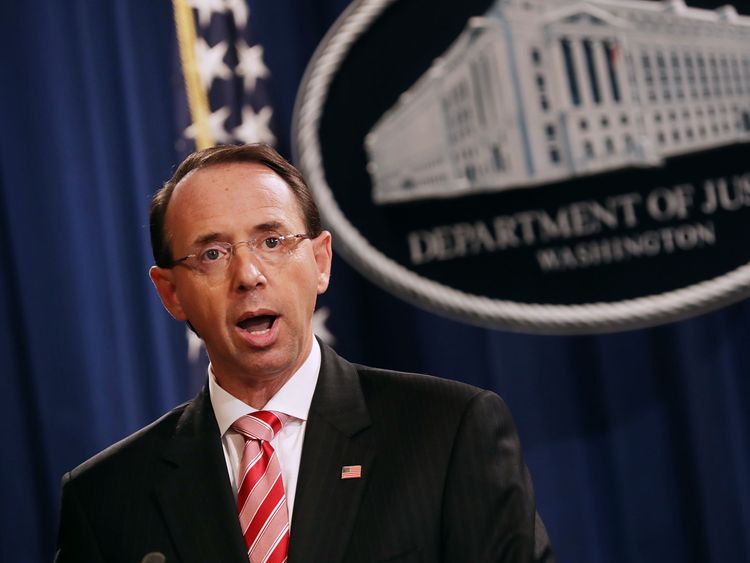President Trump and the US deputy attorney general are to meet at the White House on Thursday amid speculation Rod Rosenstein could resign or be sacked.
Mr Rosenstein oversees special counsel Robert Mueller's investigation into possible collusion between Russia and the Trump campaign before the 2016 presidential election.
And he has been the inquiry's chief public defender.
Mr Rosenstein was reportedly summoned to the White House on Monday for a meeting with chief of staff John Kelly.
Mr Trump himself was in New York for a UN meeting.
The president and Mr Rosenstein had an "extended conversation to discuss the recent news stories", said White House press secretary Sarah Sanders.
"Because the president is at the United Nations General Assembly and has a full schedule with leaders from around the world, they will meet on Thursday when the president returns to Washington, DC," she said.
Mr Rosenstein has said he will not resign and that the White House would have to sack him, according to reports.
Last week, he was reported to have suggested the idea of secretly recording Mr Trump in 2017 after the president had fired James Comey, the FBI director.
Mr Rosenstein also reportedly floated the idea of invoking the 25th Amendment to have the Cabinet remove the president from office.
If Mr Rosenstein resigns, the president has more leeway on replacing him, while sacking him would make it harder for Mr Trump to designate a successor.
Any termination or resignation would have immediate implications for special counsel Mr Mueller's investigation.
Mr Rosenstein appointed Mr Mueller and oversees his inquiry.
Former acting FBI director Andrew McCabe said that if Mr Rosenstein leaves his post, it puts the special counsel's Russia investigation "at risk".
Mr Trump had previously considered the idea of firing Mr Rosenstein in April after FBI raids on the office and home of the president's long-time personal attorney, Michael Cohen.
Cohen has since pleaded guilty to several felonies and taken part in hours of interviews with Mr Mueller.
The latest move follows the New York Times report of Mr Rosenstein's alleged comments made last year, which played to some of the president's concerns about a secret "Deep State" trying to undermine him from within the government.
Mr Rosenstein subsequently said the article was inaccurate and was based on "biased" anonymous sources "advancing their own personal agenda".

He added: "Based on my personal dealings with the president, there is no basis to invoke the 25th Amendment."
The Justice Department also released a statement from an individual who claimed Mr Rosenstein's recording comment was meant sarcastically.
As of Sunday, Mr Trump has been ambivalent over what to do about Mr Rosenstein.
Some of his confidants urged him to fire Mr Rosenstein, while others suggested he wait and see if the report was incorrect, or if it was planted by some adversary.
More from US
Earlier this year, the president publicly denied referring to his deputy attorney general as "Mr Peepers".
A memo written by Mr Rosenstein, making criticisms of the handling of an FBI investigation into Hillary Clinton's email server, was used by the White House at the time as justification for Mr Comey's firing.
[contf] [contfnew] 
Sky News
[contfnewc] [contfnewc]





